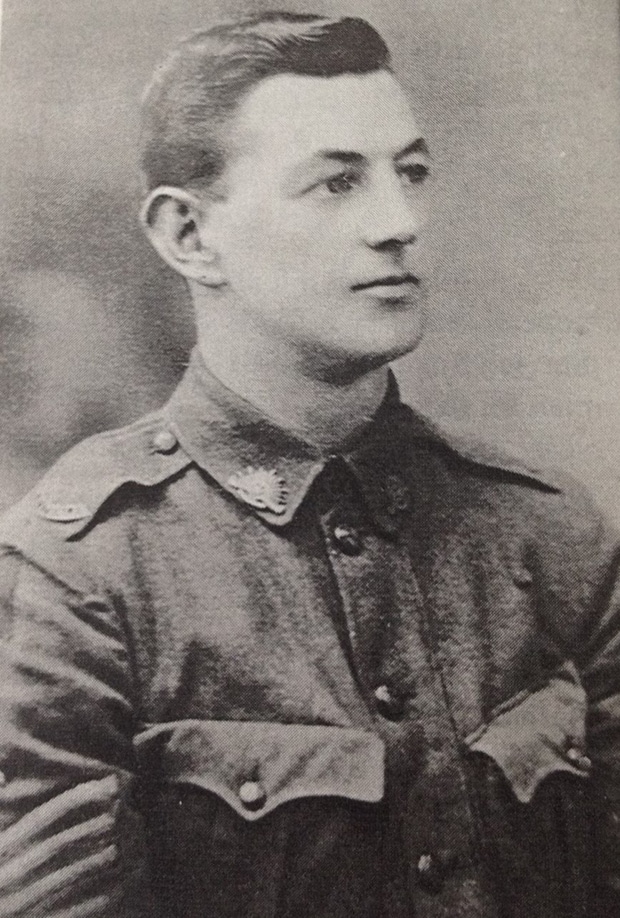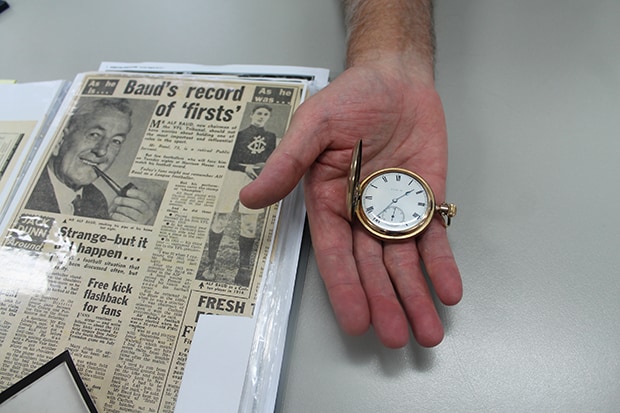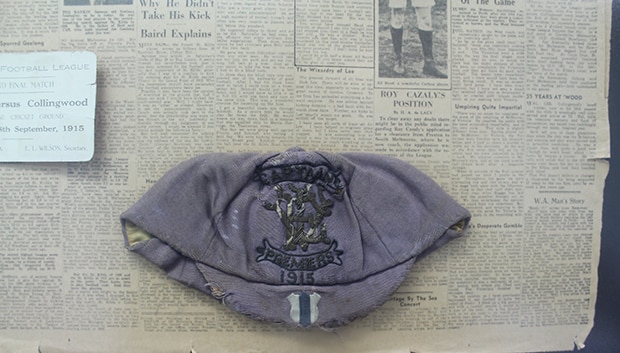On the afternoon of Saturday, September 18, 1915, one hundred springtimes ago this September, Alfred Miller Baud led Carlton onto the Melbourne Cricket Ground to meet Collingwood in a Grand Final.
Two days shy of his 23rd birthday, Baud would, within hours, become the youngest player to captain any club to a League Premiership – a record that would endure for 43 years until Collingwood’s Murray Weideman, at 22 years 216 days, completed the deed in the Grand Final of ’58 Grand Final.
The 1915 Grand Final would be the first of five won by Carlton at Collingwood’s expense, with the conquests of 1938, ’70, ’79 and ’81 to follow. It would also be the last for George Challis, whose short life would be taken by a shell that hit his trench at Armentieres some nine months later.
For Baud, a feted member of Carlton’s Jubilee Premiership team of 1914, the 1915 Grand Final would also prove to be his swansong. Like Challis, Baud was called into uniform in 1916, and by March of that year was on his way to war.
Mercifully, Sergeant Baud survived the horror – but only just. In September 1917, his battery was locked in combat at a feature later known as ANZAC Ridge, when an enemy shell exploded nearby. A shrapnel splinter smashed into the side of Baud’s head, fracturing his skull and severely impacting the sight in his left eye.

Carlton's 1915 Premiership Captain Alf Baud. (Photo: Carlton Football Club)
Quickly ferried to hospital, Baud’s life hung in the balance for some days – and were it not for his vim and vigor he wouldn’t have made it. But make it he did, and in March of 1918 he was repatriated to Australia and duly participated in the Armistice celebrations that November.
This week, in the lead-up to the 250th encounter between the game’s greatest rivals Carlton and Collingwood, Baud’s grandson Geoff Cayzer, a four-game St Kilda ruckman through 1967 and ’71, saw fit to share some precious items of memorabilia and equally precious personal recollections of his hero, whose Carlton tenure was confined to just 53 senior appearances, but netted substantial personal and team success regardless.
Amongst the items on show was Baud’s Premiership cap of 1915, the original admittance ticket to the game, and a glorious Elgin fob watch carrying Baud’s name as mark of esteem from the President and Secretary of Eaglehawk and dated May 15, 1913.

Alf Baud's fobwatch. (Photo: Carlton Football Club)
Cayzer, the long-time Managing Director of Cayzer Real Estate in Middle Park, recalled Baud sporting the fobwatch in his coat when the pair attended Carlton games at Princes Park through the 1950s.
“For some years I’d been wondering what had happened to this watch, and about six weeks ago I got a call from this chap who said ‘Geoff, you don’t know me from a bar of soap, but I’m in Queensland, my father was a jeweller who’s now got dementia and in going through some of his things I’ve found your grandfather’s fobwatch – and I’d really like you to have it’.
“Two days later, my grandfather’s watch arrived.”
Cayzer’s memories of Baud endure. How well he remembers accompanying his grandfather to the Carlton ground from the nearby North Melbourne GPO where Baud served as postmaster for many years.
“Though he was hit by the shrapnel in the First World War he looked perfectly all right,” Cayzer recalled. “But he didn’t have full vision and he used to have trouble getting on and off trams because he wasn’t 100 per cent sure where to put his foot.
“But he was my hero growing up. I remember asking him ‘What number were you?’ to which he replied ‘25’ and that’s why I followed George Ferry so closely as a kid.”
Baud died in December 1986 at the ripe old age of 94, having maintained a great connection with the game as a member of the Australian Football Council and a much-respected Tribunal panelist - and Cayzer has a ripping yarn about a famous hearing involving his close friend Carl Ditterich and old Alf which is best left to be told for another day.
Cayzer remembered his grandfather as a modest, humble person who maintained a great love for the game and thought much about it.
The ’15 cap and Grand Final admittance ticket has graced the wall of Cayzer’s office for many years. The items are enclosed in a glass frame carrying a report penned for The Sporting Globe by the legendary Roy Cazaly, the then South Melbourne coach, in 1937.

Alf Baud's 1915 Premiership cap. (Photo: Carlton Football Club)
The report includes Cazaly’s following critique of Baud’s playing prowess and perhaps Roy is deserving of the final word.
“He (Baud) could play anywhere. The younger generation are proud to speak of the amazing balance of Haydn Bunton. I think that Baud by comparison would have made (Haydn) Bunton look ordinary.Baud would have been a football sensation had it not been for the war. That finished his career. His war injuries were severe.
“You would have stopped Baud one minute, or should I say you thought you had stopped him; then in a flash he was past you. He was a thinker. Every counter you met him with was in turn countered by this most elusive footballer.
Baud was one of the greatest players we have produced. I don’t think he ever reached his top.
“I could do with half a dozen Alf Bauds at south. If you know where they are I’ll be glad to meet you.”



